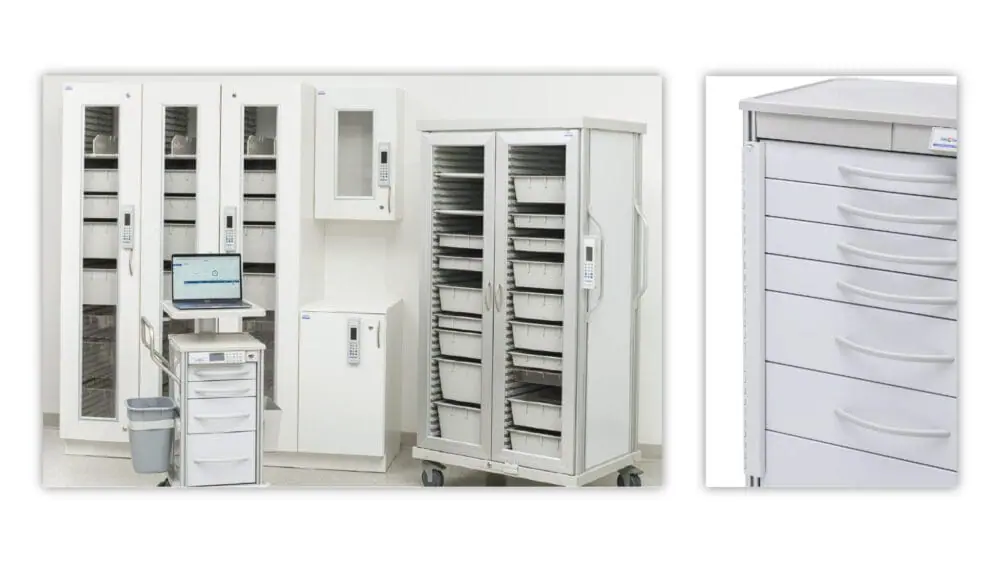
The best medical storage locking systems are those that provide an appropriate level of security, help staff provide efficient care, and control costs. However, different types of medical supplies require different types and levels of security.
What is the best way to choose locking systems for your facility?
Perform a needs assessment.
For example, controlled substance storage requires a robust locking system, such as a locked box anchored into a mounted cabinet accessed by two locks requiring two separate keys.
However, a cart accessed by a simple PIN code may be all that is needed to secure IV fluids.
Here are some important considerations when purchasing locking systems for your hospital storage solutions.
Consider the Supplies You Want to Secure
The Food and Drug Administration requires that controlled substances be stored in a “securely locked, substantially constructed cabinet.”
Depending on the state regulations, it may be necessary to place controlled substances in a lock box attached to a cabinet bolted to the wall. The cabinet and the lockbox must have separate locks accessed by two non matching keys.
Medical supplies consistently used in one area may be stored in fixed cabinets accessed by a keyed lock.
On the other hand, medical supplies routinely transported to other areas, such as medications, procedure supplies, and emergency medical equipment, may best serve your staff by being stored in rolling carts equipped with electronic locks.
Temperature-sensitive medications may need to be stored in a locked refrigerator. Medical supplies and packaging compromised by temperature changes or moisture will benefit from being stored in a temperature and humidity-controlled supply room.
Endoscopes stored in fixed cabinets equipped with electronic locks that track users may work well near procedure rooms, such as in an endoscopy unit.
Portable scope cabinets with built-in tracking devices can help managers track users and the location of the cabinets. Tracking devices can often be configured to set off an alarm if the device or piece of equipment moves beyond preset boundaries.
Consider Local, State, and Federal Regulations
Check the regulations that govern the facility to be sure that the locks used meet the local laws.
Don’t Forget Cybersecurity Measures
A cybersecurity plan will include any medical devices and equipment that store patient data or are Wi-Fi-enabled. Hospitals typically partner with a network security vendor to manage the wireless networks.
Choose the Right Lock for the Job
Breakaway Locks
Breakaway locks are tamper-evident plastic locks. Typically used for crash carts or other emergency medical supply storage units, breakaway locks allow fast access when response time matters most.
Once a breakaway lock is broken it can not be reused. Crash carts are restocked and a new breakaway lock is applied before the cart is placed back into service.
Mechanical Locks
A mechanical lock is a lock that requires a physical key. This key might be a metal key or even a push button code that moves tumblers into place so the door or drawer can be opened.
Electronic Locks
Electronic locks use electricity or battery power. They don’t require a physical metal key, but do require a code or badge that can activate the lock. Electronic locks are more convenient than mechanical locks and can provide better security in some situations.
Some electronic locks accept a badge with an embedded chip or use a biometric fingerprint reader.
WiFi Options
WiFi platforms connected to electronic locking systems provide additional security because of the ability to track users and retrieve reports, such as with the InnerSpace Cloud platform. Managers can monitor and control security access across a fleet of locked cabinets and carts from one computer.
Healthcare facilities use a variety of locking systems. The key is to assess the needs of each unit and choose the locks that provide the best security while providing fast and efficient medical supply access. Remember, the best patient care is efficient, safe, and cost-effective.

Cindy Blye
Content WriterCindy Blye, BSN, RN, CCM is a Registered Nurse and Certified Case Manager. She is an Alumni of West Virginia University School of Nursing (BSN), and a member of the Association of Health Care Journalists and The Authors Guild.
